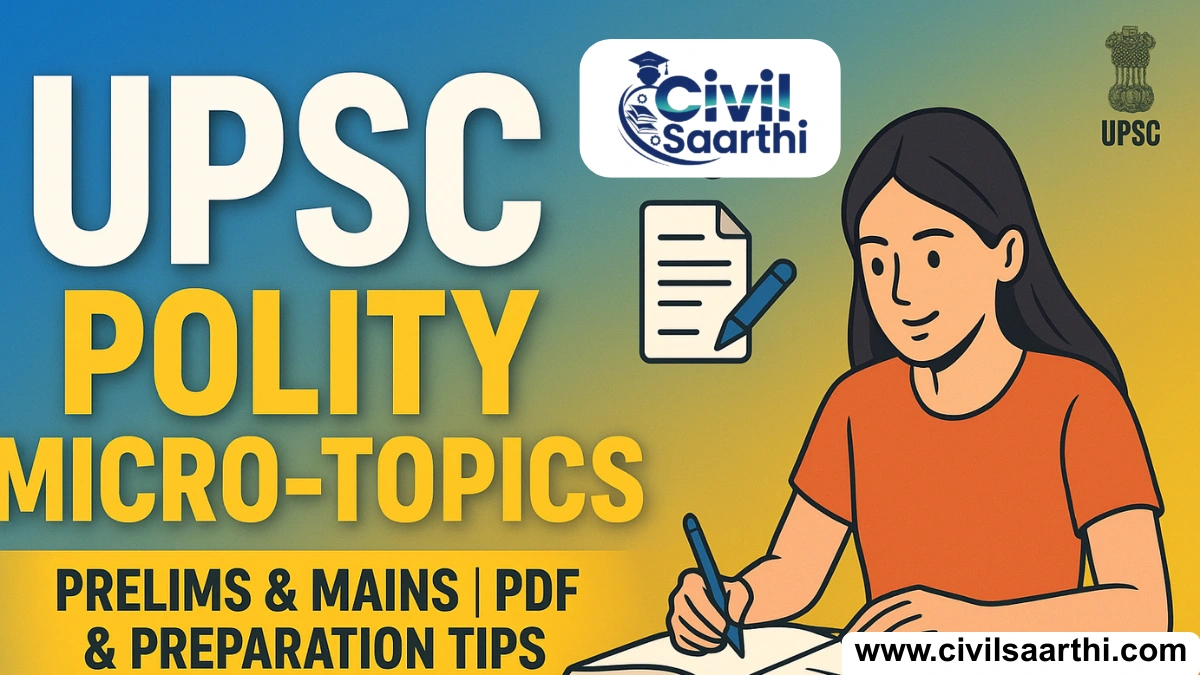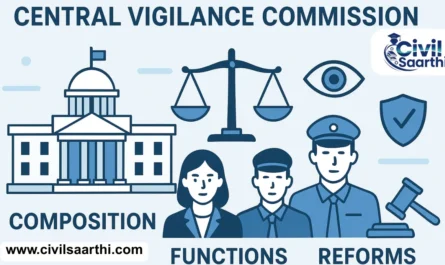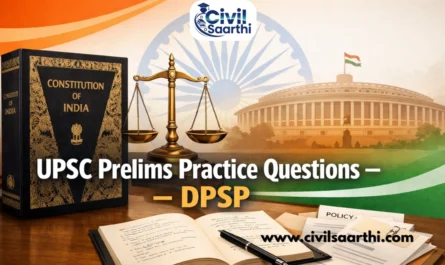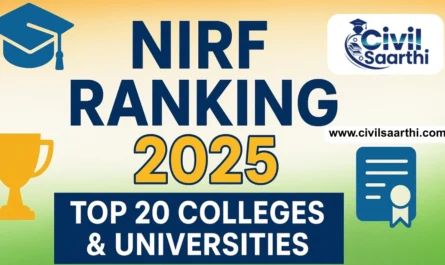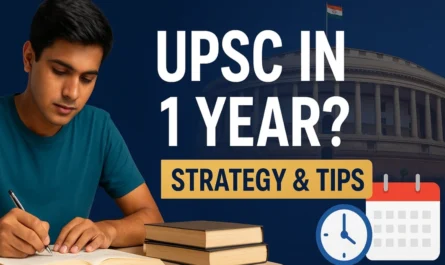The UPSC Polity syllabus covers both Prelims and Mains, testing candidates on the Indian Constitution, governance, political institutions, social justice, and public policy. It combines static knowledge with analytical skills, linking historical foundations with contemporary issues. Mastery of these micro-topics is crucial, as questions often overlap with current affairs and administrative developments.
UPSC Polity Micro-topics Syllabus
The UPSC Polity Syllabus is structured to cover every aspect of the Indian political system, from constitutional provisions to the functioning of government bodies and schemes. For Prelims, emphasis is on factual knowledge and constitutional articles, while Mains requires deeper analysis, application, and integration with current affairs.
UPSC Syllabus Micro-topics PDF Download
A structured PDF of Polity micro-topics is extremely useful for planning, revision, and practice. It provides a ready reference of topics for Prelims and Mains with detailed sub-topics, helping aspirants prioritize areas based on weightage and difficulty. A PDF acts as a comprehensive checklist for study and revision without missing any crucial section.
UPSC Syllabus Subject-wise Micro-topics PDF Download Click here
UPSC Polity Micro-topics Syllabus Detailed
Here is a detailed liste of UPSC Polity Micro-topics Syllabus for both Prelims and Mains exam curated by our expert team. This will help the UPSC Aspirants in getting clear idea about the detailed UPSC Polity Syllabus and candidates will be able to prepare using these topics.
1. Historical Background of Indian Constitution
- Regulating Act 1773: significance, governor-generalship.
- Pitt’s India Act 1784.
- Charter Acts: 1813, 1833, 1853.
- Government of India Acts: 1858, 1909, 1919, 1935.
- Indian Councils Acts.
- Morley-Minto reforms (1909).
- Montagu-Chelmsford reforms (1919).
- Simon Commission, Nehru Report.
- August Offer, Cripps Mission, Cabinet Mission Plan.
- Indian Independence Act 1947.
- Extra additions: how GOI Act 1935 shaped today’s Constitution (federal structure, PSCs, emergency).
2. Making of the Constitution
- Constituent Assembly: composition, elections, committees.
- Role of B.N. Rau, Sir Stafford Cripps, Cabinet Mission.
- Role of key leaders: Ambedkar, Nehru, Rajendra Prasad.
- Drafting Committee and sub-committees.
- Objectives Resolution.
- Criticism of the Constituent Assembly.
- Adoption, enforcement, significance of January 26.
- Extra additions: debates on secularism, federalism, language in CA proceedings.
3. Salient Features of the Constitution
- Lengthiest written constitution.
- Blend of rigidity and flexibility.
- Federal system with unitary bias.
- Parliamentary system.
- Independent judiciary.
- Universal adult franchise.
- Fundamental Rights, Duties, Directive Principles.
- Secularism and socialism.
- Emergency provisions.
- Extra additions: comparison with US, UK, Canadian constitutions.
4. Preamble
- Text and importance.
- Keywords: sovereign, socialist, secular, democratic, republic.
- Justice, liberty, equality, fraternity.
- Amendability: Kesavananda Bharati case.
- Berubari case.
- Extra additions: debates on secularism and socialism insertions in 1976.
Click here to Read Detailed Notes on Preamble
5. Union and Its Territory
- Article 1 to 4: Union of States, admission, formation of new states.
- Reorganization of states: linguistic basis (1956).
- Important state reorganization movements.
- Recent developments: creation of Telangana, J&K reorganization 2019.
- Extra additions: UPSC often asks about Article 3 and its scope.
6. Citizenship
- Constitutional provisions (Articles 5–11).
- Citizenship Act 1955: modes of acquiring and losing.
- Overseas Citizens of India (OCI).
- Citizenship Amendment Act 2019: provisions, controversies.
- Dual citizenship debate.
- Extra additions: current debates on refugees and illegal migrants.
Click here to Read Detailed Notes on Citizenship
7. Fundamental Rights
- Right to Equality (14–18).
- Right to Freedom (19–22).
- Right against Exploitation (23–24).
- Right to Freedom of Religion (25–28).
- Cultural and Educational Rights (29–30).
- Right to Constitutional Remedies (32).
- Restrictions, exceptions, reasonable restrictions.
- Suspension of rights during emergency.
- Important judgments: Kesavananda Bharati, Maneka Gandhi, Puttaswamy (privacy).
- Extra additions: SC’s interpretation of right to internet, same-sex marriage debate.
Click here to Read Detailed Notes on Fundamental Rights
8. Directive Principles of State Policy (DPSPs)
- Socialist, Gandhian, Liberal-intellectual principles.
- Difference between DPSPs and Fundamental Rights.
- Importance in governance.
- Landmark cases: Minerva Mills, Kesavananda Bharati.
- 42nd and 44th amendments.
- Extra additions: new ideas like Uniform Civil Code, right to health.
Click here to Read Detailed Notes on Directive Principles of State Policy (DPSP)
9. Fundamental Duties
- List of 11 duties.
- Swaran Singh Committee.
- Importance and criticism.
- Relation with rights.
- Enforcement issues.
- Extra additions: current debate on compulsory voting and environmental duties.
Click here to Read Detailed UPSC Notes on Fundamental Duties
10. Amendment of the Constitution
- Article 368.
- Types of amendments: simple majority, special majority, special with states.
- Important amendments: 42nd, 44th, 52nd, 73rd, 74th, 86th, 101st (GST).
- Basic structure doctrine.
- Extra additions: recent debates on simultaneous elections and constitutional change.
11. Basic Structure of the Constitution
- Origin: Kesavananda Bharati case.
- Elements of basic structure: supremacy of constitution, federalism, secularism, judicial review.
- Later cases: Indira Gandhi v. Raj Narain, Minerva Mills, SR Bommai.
- Extra additions: application of basic structure in contemporary judgments (CJI appointment, J&K).
12. Parliament and State Legislatures
- Lok Sabha, Rajya Sabha, President.
- Powers and functions: legislative, financial, judicial.
- Parliamentary privileges.
- Law-making process.
- Anti-defection law (52nd and 91st amendments).
- State legislatures: Vidhan Sabha, Vidhan Parishad.
- Special status of Legislative Councils.
- Extra additions: debates on simultaneous elections, anti-defection reforms.
13. Executive: Union and State
- President: election, powers, impeachment.
- Vice President.
- Prime Minister and Council of Ministers: powers, collective responsibility.
- Cabinet committees.
- Governor: appointment, powers, controversies.
- Chief Minister and State Council.
- Extra additions: recent SC rulings on Governor’s discretionary powers.
14. Judiciary
- Structure: Supreme Court, High Courts, Subordinate courts.
- Appointment and removal of judges.
- Judicial review, judicial activism, PIL.
- Collegium system.
- Landmark cases: Kesavananda Bharati, NJAC case, Right to Privacy.
- Tribunals.
- Extra additions: recent debates on judicial accountability, AI in courts.
15. Federal System
- Division of powers: Union, State, Concurrent lists.
- Centre-state relations: administrative, legislative, financial.
- Inter-state councils, zonal councils.
- Governor’s role.
- Extra additions: cooperative vs competitive federalism, GST Council disputes.
- Seperation of Power
16. Local Government
- 73rd Amendment: Panchayati Raj system.
- 74th Amendment: Urban local bodies.
- Significance and challenges.
- Finance Commission role in local bodies.
- Extra additions: debates on women’s reservation in local government.
17. Constitutional Bodies
- Election Commission of India.
- UPSC.
- National Commission for Backward Class.
- National Commisison for Scheduled Caste.
- National Commisison for Scheduled Tribe
- Goods and Services Tax Council.
- Special Officer for Linguistic Minorities.
- Finance Commission.
- CAG.
- Extra additions: reforms for electoral bonds, transparency.
18. Non-Constitutional Bodies
- NITI Aayog.
- NHRC, SHRC.
- Lokpal and Lokayuktas.
- CBI, NIA (statutory but key).
- Extra additions: relevance of data protection authority, new digital regulators.
19. Emergency Provisions
- Types: National, State, Financial.
- Articles 352, 356, 360.
- 42nd and 44th amendments.
- Judicial review of emergencies.
- Extra additions: 1975 Emergency case studies, current debates on misuse of Article 356.
20. Elections and Political Parties
- Election process: first-past-the-post, proportional representation.
- Delimitation.
- Political parties and anti-defection law.
- Electoral reforms.
- Role of Election Commission.
- Extra additions: simultaneous elections debate, EVM vs paper ballot.
21. Current Relevance (Polity in 2024–25 news)
- 75 years of Constitution enforcement (2025).
- Supreme Court judgments on same-sex marriage, Article 370.
- Debate on Uniform Civil Code.
- Electoral bonds verdict.
- Digital Personal Data Protection Act 2023 implementation.
- Women’s Reservation Bill (Nari Shakti Vandan Adhiniyam 2023) operationalization.
Click here to Read Detailed Notes on Important Landmark Judgements
Booklist for UPSC Polity Syllabus
Here is a detailed booklist for UPSC Polity Syllabus
| Level | Book / Material | Purpose |
|---|---|---|
| Prelims | NCERT Class XI Indian Constitution at Work | Basic understanding of Constitution and governance |
| Prelims & Mains | M. Laxmikanth – Indian Polity | Comprehensive coverage of Polity concepts and analysis |
| Reference | D.D. Basu – Introduction to the Constitution of India | Detailed legal and constitutional interpretation |
| Mains | Government Reports & Yellow Books | Analysis of policies, schemes, and governance reforms |
Preparation Tips for UPSC Polity
Build Foundation with NCERTs: Start with Class XI and XII books to understand constitutional basics.
Download Free UPSC NCERT PDF from Class 6 to 12th All Subjects Click here
Use Standard Reference Books: Progress to M. Laxmikanth and D.D. Basu for comprehensive coverage.
Current Affairs Integration: Read newspapers and magazines regularly to connect static topics with real-world events.
Revision Strategy: Maintain short notes and revise regularly, especially fundamental rights, duties, and amendments.
Practice Questions: Solve previous year question papers and mock tests to familiarize yourself with exam patterns.
Topic-wise Weightage: Allocate more time to high-yield topics like Constitution, Parliament, Judiciary, and Social Justice.
Flowcharts and Mindmaps: Use visual aids for quick recall of complex structures like separation of powers, legislative procedures, and governance frameworks.
Discussion & Group Study: Discuss key topics with peers or mentors to clarify doubts and develop analytical thinking.
UPSC Main Answer-writing Tips for UPSC Polity
Structured Answers: Always have an introduction, body, and conclusion. Use headings and bullet points for clarity.
Integrate Current Affairs: Link static topics with recent government schemes, judicial pronouncements, or policy reforms.
Use Examples and Case Studies: Illustrate points with landmark judgments, historical events, or government initiatives.
Balanced Analysis: Present pros and cons where relevant, especially in governance and policy-related questions.
Conciseness and Clarity: Avoid unnecessary verbosity; ensure every line adds value.
Practice Answer Writing: Regular timed practice improves speed, coherence, and presentation under exam conditions.
Diagrams & Flowcharts: Use visual representation for complex topics like federal structure, separation of powers, and policy implementation process.
UPSC Polity Micro-topics Syllabus FAQs
Q1: What are UPSC Polity micro-topics?
A1: Micro-topics are detailed sub-sections of the UPSC Polity syllabus. They break down larger subjects like the Constitution, governance, judiciary, and social justice into smaller, focused areas for easier understanding, revision, and targeted preparation.
Q2: How is Polity syllabus different for Prelims and Mains?
A2: Prelims focuses on factual knowledge, constitutional articles, schemes, and institutions for objective questions. Mains requires analytical thinking, structured answers, case studies, and integration of current affairs along with deeper understanding of governance, policies, and judicial pronouncements.
Q3: Which books are most recommended for Polity preparation?
A3: Core books include Indian Polity by M. Laxmikanth, Introduction to the Constitution of India by D.D. Basu, and NCERT Class XI Indian Constitution at Work. For Mains, additional government reports, policy papers, and practice notes from coaching institutes help.
Q4: How should one prepare for Polity efficiently?
A4: Start with NCERTs for basics, then refer to standard textbooks. Regularly integrate current affairs, make short notes, revise frequently, and solve previous year question papers. Use flowcharts and mindmaps for complex topics like separation of powers and legislative procedures.
Q5: How important is current affairs for Polity?
A5: Extremely important. Linking current affairs with static topics like laws, policies, and governance helps in both Prelims and Mains. Examples include recent Supreme Court judgments, government schemes, or amendments.
Q6: How to improve answer-writing skills in Polity for Mains?
A6: Practice structured answers with introduction, body, and conclusion. Use headings, bullet points, examples, and case studies. Integrate current affairs, maintain clarity, and balance analysis with pros and cons wherever applicable.
Q7: Are Panchayati Raj and local governance important for UPSC Polity?
A7: Yes, both Prelims and Mains include questions on 73rd and 74th Amendments, roles and functions of local bodies, and decentralization of governance. They are high-yield topics.
Q8: Can I rely only on one book for Polity?
A8: No. While M. Laxmikanth covers most topics, it’s important to read NCERTs for fundamentals and refer to government schemes, reports, and case studies for Mains analytical questions.
Q9: How often should one revise Polity topics?
A9: Regular revision is essential due to the vast syllabus. Ideally, revise each topic at least 2–3 times before Prelims and continue periodic revision for Mains, focusing on current affairs and updates.
Q10: Is practicing previous year questions necessary?
A10: Yes. It helps identify recurring themes, question patterns, and high-yield topics. It also improves speed, accuracy, and familiarity with UPSC’s questioning style.

